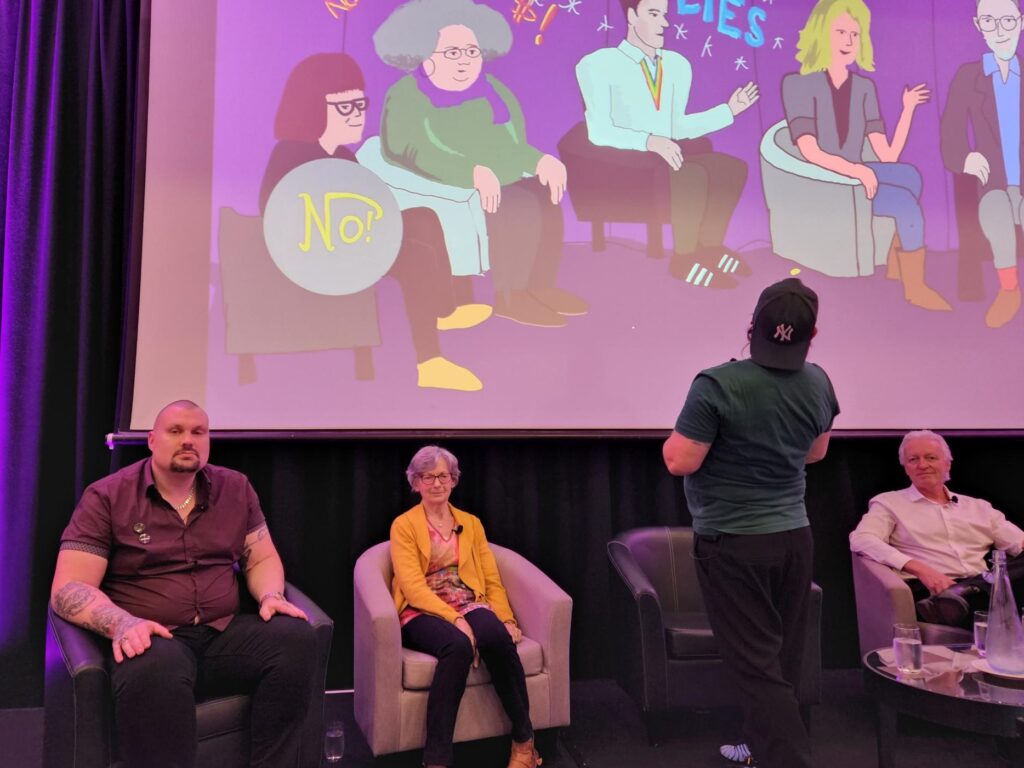| Next FFDLR meeting via Zoom: Thursday, 29th September 7.30pm Join Zoom Meeting https://us02web.zoom.us/j/81116148913?pwd=T2pnRmtpTFlZWW5FbGZOUkQ3WFdsdz09 Donations are always welcome. BSB: 801009 Account Number: 001194974 Please remember to reference your name |
| STOP PRESS Premier Perrottet has today (21/9) responded to the NSW Ice Inquiry – a long awaited response. Not what FFDLR would have preferred – no pill testing, no extra supervised injecting rooms, no decriminalisation of drugs as recommmended in the inquiry. But $358 million to address treatment gaps, $141 million to expand justice initiatives. “Hundreds of new workers will be coming on board to help people who need it, including nurses, clinicians, psychologists and caseworkers with the majority based in rural and regional areas”, said Dominic Perrottet |
| ACT Drug Strategy Action Plan 2022 -2026 https://yoursayconversations.act.gov.au/act-drug-strategy-action-plan-2022-2026 The draft ACT Drug Strategy Action Plan 2022-2026 (the Action Plan) is open for public consultation, submissions can be made up until 5pm Monday 24 October 2022. Please follow this link to the consultation page for further details for drafting a submission. |

| Progress on Decriminalisation in the ACT Drugs of Dependence (Personal Use) Amendment Bill 2021 which was to be debated and voted on in the September sitting of the ACT Assembly has now been postponed to the October sitting (11th – 13th; 18th – 20th). |
| What happens when we decriminalise drugs? Life Matters with Hillary Harper – This is certainly worth listening to. https://www.abc.net.au/radionational/programs/lifematters/what-happens-when-we-decriminalise-drugs-/101389420 The ACT will soon become the first jurisdiction to decriminalise the possession and use of illicit drugs. It’s a pivot to treating drugs as a health issue, rather than a law and order issue, and experts say it’s a major step in reducing harms. So what does a decriminalised community actually look like and why does it still give some pause? Guests: Dr David Caldicott, Clinical Senior Lecturer, Emergency Medicine, ANU Professor Alison Ritter, Director of the Drug Policy Modelling Program at UNSW, NHMRC Senior fellow Nat Tencic, Producer |
| What happens when we decriminalise drugs? Life Matters with Hillary Harper – This is certainly worth listening to. https://www.abc.net.au/radionational/programs/lifematters/what-happens-when-we-decriminalise-drugs-/101389420 The ACT will soon become the first jurisdiction to decriminalise the possession and use of illicit drugs. It’s a pivot to treating drugs as a health issue, rather than a law and order issue, and experts say it’s a major step in reducing harms. So what does a decriminalised community actually look like and why does it still give some pause? Guests: Dr David Caldicott, Clinical Senior Lecturer, Emergency Medicine, ANU Professor Alison Ritter, Director of the Drug Policy Modelling Program at UNSW, NHMRC Senior fellow Nat Tencic, Producer |
| Published letter to the editor The following letter was published in the Canberra Times on 19/09/2022 and received top billing. Decriminalise drugs and improve support to deal with jail So much of the rhetoric in the article (“Reducing jail rates stats in community”, September 17, p 27) is well known and understood but it is just not making traction. Kinner realises that a majority of those in prison have mental health or substance abuse issues or both. The question he doesn’t address is “why do we continue jailing people suffering from these conditions”. The answer is undoubtedly because we have made the use of certain drugs illegal. Some, who become dependent on drugs will commit crime to pay for the drugs their bodies crave. We all know this. If we want to reduce recidivism (and crime) we must stop putting people with health problems in prison in the first place. To do this we must decriminalize personal use of drugs and provide a kit bag of non-punitive accredited treatment and education services, broaden social services and stop the shame and stigma that goes hand in hand with illegal drug use M McConnell Giralang |
| Rethink Addiction I was invited to be part of a panel at this Convention. Photo shows from left, Baden Hicks, Marion McConnell, Rocket Bretherton and Keith Banks all participating in the third session of the first day namely ‘The Impact of criminalisation’. All speakers had lived experience. Baden and Rocket spoke of their difficulties in receiving the right treatment for both their drug issues and mental health and the impact the criminal law and prison had on years of their lives. Keith Banks is a former Queensland Police undercover officer. His experiences led him to advocate for drug law reform. Keith commented on the difficulty in changing police culture including the culture and nature of promotions through the ranks, targets for drug charges being met as a financial/budget incentive and the political nature of senior appointments. I told my personal story, which I have done so many times, but it still seemed to gather interest as I had many comments and people thanking me for telling it yet again. I did make a few contacts and our twitter followers increased. There are so many good people suffering because of our unjust drug laws. The theme of the whole conference was of course “Rethink Addiction” and all speakers and those on the panels had stories of lived experience including alcohol and gambling as well as illicit drugs. You can imagine how emotional and draining this conference was. However so many people gathered telling their stories and revealing many reasons why we all need to rethink addiction had a powerful impact on those 300 attending. Let’s hope it all spills over to the law makers and keepers. It was unfortunate that the cancellation of Parliament for that week meant contact with politicians which had been arranged was cancelled. If you would like to know more about the convention here is a link to a Croakey Health Media article. |

| Canberra’s pill-testing facility checked 58 samples in its first month, here’s what it found By Miriam Webber https://www.canberratimes.com.au/story/7875005/canberras-pill-testing-facility-checked-58-samples-in-its-first-month-heres-what-it-found/ This full article is only available if you are a subscriber to the Canberra Times’ In its first month of operating, Canberra’s fixed-site pill testing service tested 58 samples, and led to 18 samples being discarded. The CanTEST Health and Drug Checking Service on Moore Street tests pills and other drugs for harmful substances. The service is confidential and people do not need proof of identity to access it. The facility tested samples of Ketamine, MDMA, heroin, methamphetamine, cocaine and 6-APB in the first month of its six-month pilot program. The drugs were analysed by chemists at the ANU Research School of Chemistry. |
| From FFDLR Archives From the beginning Families and Friends for Drug Law Reform was sceptical that the ACT prison would ever live up to the grand ideals of its promoters.. On 20 August 2004 Jon Stanhope the Chief Minister declared that the government’s “ . . . aim, through the ACT prison, is to change the fate of prisoners, offer them a better future and equip them with skills to live successfully in the community after their release.” It was to be like no other prison in Australia; it would be human rights compliant. We were never carried away by the belief that the ACT would succeed where so many others had failed. The gross overrepresentation of Indigenous Canberrans many drug dependent, and allegations of drug use by staff bears witness to the death of that dream. On 10 May 1999 we argued before an Assembly enquiry that the case for expanded prison facilities has not been made out; and the development of an effective, evidence-based drug treatment strategy should be a condition precedent for the establishment of an ACT prison. Families and Friends for Drug Law Reform noted that some 70 to 80 per cent of prisoners are drug users who are incarcerated for drug related offences. Prisons are thus a core element of the community’s response to the health issue of drug addiction. Our position is that this approach is inherently misguided, inhumane and counter productive. It is therefore essential that any expansion of prison capacity be viewed in the context of drug policy. The evidence is available that if medically supervised prescription of heroin were introduced as one of the available treatments, an overall fall in offences of some 68% could be expected by users on that program. For offences particularly associated with the drug lifestyle such as burglary, muggings, robbery, pick-pocketing and drug trafficking the reduction is likely to be in the region of 90%. Experience to date from virtually all gaols is that: a) the handling of drug dependent prisoners is a particular problem for prison administration; b) it has been impossible to exclude drugs from circulating in gaols and that a significant number of prisoners initiate drug use in gaols. An effective drug treatment strategy based on evidence of what works must therefore be a central element in the planning of an ACT prison and not merely a subsidiary issue to be considered after a decision has been taken to proceed. This is essential not only for the prisoners themselves but to protect the community at large from HIV, hepatitis C and other diseases easily spread among drug using prisoners. Public health authorities are warning that there is a serious danger of prisons being a breeding ground for an epidemic of these diseases in the general community unless precautions are taken. |

